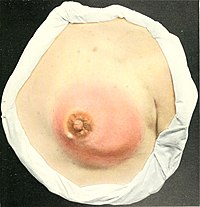
Photo from wikipedia
Nisin Z is a possible alternative for treating bovine mastitis by inhibiting mastitis-causing pathogens and having anti-inflammatory activity. However, the anti-inflammatory mechanism of nisin Z on mastitis is unknown. Our… Click to show full abstract
Nisin Z is a possible alternative for treating bovine mastitis by inhibiting mastitis-causing pathogens and having anti-inflammatory activity. However, the anti-inflammatory mechanism of nisin Z on mastitis is unknown. Our study aimed to investigate the mechanisms of nisin Z on mastitis. Our results showed that nisin Z inhibited the activation of the ERK1/2 and p38 mitogen-activated protein kinase (MAPK) signaling pathway, decreased the release of pro-inflammatory cytokines (i.e., tumor necrosis factor-α, IL-1β, and IL-6), and increased the anti-inflammatory cytokine (IL-10) in lipopolysaccharide (LPS)-induced MCF10A cells. After intraperitoneal injection, nisin Z significantly decreased inflammatory cell infiltration in the mammary gland, as well as decreased myeloperoxidase and pro-inflammatory cytokines in serum and mammary gland. Western blot analysis revealed that nisin Z also dramatically suppressed the activation of the ERK1/2 and p38 MAPK signaling pathways in LPS-induced mastitis mice. We also found that nisin Z treatment could enhance the blood-milk barrier. In summary, our study demonstrated that nisin Z exerted an anti-inflammatory effect by inhibiting the ERK1/2 and p38 MAPK signaling pathway and promoting the blood-milk barrier on LPS-induced mastitis.
Journal Title: Journal of dairy science
Year Published: 2022
Link to full text (if available)
Share on Social Media: Sign Up to like & get
recommendations!